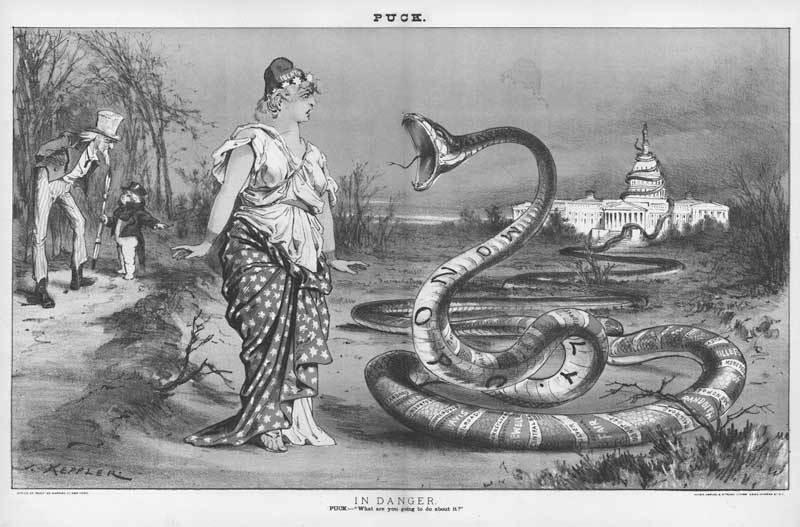![]()
In the film version of Forrest Gump (but not, if memory serves, in the novel), Forrest’s mother tries to convince the local elementary school principal that her son belongs at his local elementary school rather than at an institution for what we would now call “special needs” students. The two reach an understanding on Mrs. Gump’s remarkably squeaky bed while Forrest waits on the front porch.
That scene popped to mind uninvited in early March when fifty parents, test administrators, and college sports coaches were indicted in a nationwide college admissions bribery scandal.
Coaches allegedly took bribes to accept students as fake athletic recruits to get around academic standards. Test prep services supposedly taught students how to cheat on tests and bribed proctors to smooth the way for the cheating. An “admissions consultant,” William Singer, is accused of orchestrating the scheme to the tune of $25 million.
None of which, obviously, is According to Hoyle.
I’m surprised, though, at the vitriol directed at the parents in particular.
I suspect most movie viewers empathized with the fictional Mrs. Gump, who did whatever she felt she had to do to secure the best education possible for her child.
Real-life parents like actors Lori Loughlin and Felicity Huffman — the two most famous of the indicted parents — did whatever they felt they had to do to secure the best educations possible for their children as well.
The difference, of course, is that the fictional Mrs. Gump was poor, while Loughlin and Huffman are wealthy.
The public heartburn over Loughlin and Huffman seems less about them bribing their kids into good schools than about them being able to AFFORD to bribe their kids into good schools.
Suppose the scandal had unfolded in a different way. What if, instead of rich people writing checks they could afford, it was working class parents scraping together money they really couldn’t afford, or trading menial work or even sexual favors a la Mrs. Gump, for illicit “admissions assistance?”
In that alternative scenario, I suspect most would regard the parents as victims, not as evil-doers.
In that alternative scenario, I expect that most parents could see themselves doing exactly the same things in the same circumstances.
“Let me tell you about the very rich,” wrote F. Scott Fitzgerald. “They are different from you and me.” True. But not when it comes to loving their children. I won’t condemn them for that.
Thomas L. Knapp (Twitter: @thomaslknapp) is director and senior news analyst at the William Lloyd Garrison Center for Libertarian Advocacy Journalism (thegarrisoncenter.org). He lives and works in north central Florida.
PUBLICATION/CITATION HISTORY
- “I’m Shocked — Shocked! — That Wealthy Parents Love Their Kids, Too,” by Thomas L. Knapp, River Cities’ Reader (Iowa), 03/20/19
- “I’m shocked that wealthy parents love their kids too,” by Thomas L. Knapp, Hendricks County, Indiana Flyer, 03/21/19
- “I’m Shocked — Shocked! — that Wealthy Parents Love Their Kids, Too,” by Thomas L. Knapp, OpEdNews, 03/22/19
- “I’m shocked — shocked! — that wealthy parents love their kids too,” by Thomas L. Knapp, Nashville, Tennessee Tennessean, 03/24/19
- “I’m shocked — shocked! — that wealthy parents love their kids too,” by Thomas L. Knapp, Indianapolis, Indiana Star, 03/24/19
- “I’m shocked — shocked! — that wealthy parents love their kids too,” by Thomas L. Knapp, St. George, Utah Daily Spectrum, 03/24/19
- “I’m shocked — shocked! — that wealthy parents love their kids too,” by Thomas L. Knapp, El Paso, Texas Times, 03/24/19
- “I’m shocked — shocked! — that wealthy parents love their kids too,” by Thomas L. Knapp, USA Today, 03/24/19
- “I’m shocked — shocked! — that wealthy parents love their kids too,” by Thomas L. Knapp, El Paso, Texas Times, 03/24/19
- “I’m shocked — shocked! — that wealthy parents love their kids too,” by Thomas L. Knapp, The Arizona Republic, 03/24/19
- “I’m shocked — shocked! — that wealthy parents love their kids too,” by Thomas L. Knapp, Fon du Lac, Wisconsin Reporter, 03/24/19
- “I’m shocked — shocked! — that wealthy parents love their kids too,” by Thomas L. Knapp, Fort Collins, Colorado Coloradoan, 03/24/19
- “I’m shocked — shocked! — that wealthy parents love their kids too,” by Thomas L. Knapp, Rochester, New York Democrat & Chronicle, 03/24/19
- “I’m shocked — shocked! — that wealthy parents love their kids too,” by Thomas L. Knapp, Cincinnati, Ohio Enquirer, 03/24/19
- “I’m shocked — shocked! — that wealthy parents love their kids too,” by Thomas L. Knapp, Milwauke, Wisconsin Journal Sentinel, 03/24/19
- “I’m shocked — shocked! — that wealthy parents love their kids too,” by Thomas L. Knapp, Detroit, Michigan Free Press, 03/24/19
- “I’m Shocked — Shocked! — that Wealthy Parents Love Their Kids, Too,” by Thomas L. Knapp, Ventura County, California Citizens Journal, 03/22/19
- “I’m shocked — shocked! — that wealthy parents love their kids too,” Richmond, Virginia Legacy [web and print editions], 03/26/19


